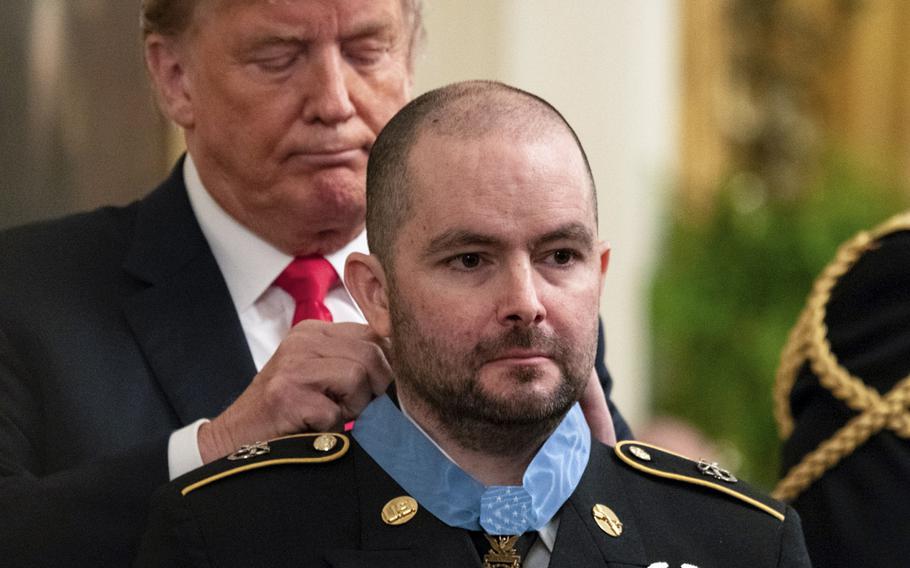
President Donald Trump presents former Army Staff Sgt. Ronald J. Shurer II the Medal of Honor during a White House ceremony on Monday, Oct. 1, 2018. (Stars and Stripes)
Ronald Shurer, the Green Beret medic awarded the Medal of Honor for aiding the wounded during a six-hour firefight in Afghanistan in 2008, died of lung cancer Thursday. He was 41.
His death was announced by the U.S. Secret Service, for whom Shurer had worked since retiring from the Army in 2009.
“Today, we lost an American Hero: Husband, Father, Son, Medal of Honor Recipient — Special Agent Ronald J. Shurer II,” the Secret Service said in a tweet. “From a grateful Nation and Agency — your memory and legacy will live on forever.”
Shurer was diagnosed with stage 4 lung cancer in 2017 and had chronicled his treatment and hospitalization on Instagram.
From his room at Sibley Memorial Hospital in Washington, D.C., Shurer posted a message Wednesday with a photo of him with an oxygen tube in his mouth. Beside him was his wife, Miranda, smiling hopefully.
“Very upset to write this ... been unconscious for a week,” the message said. "They are going to try and take it out in a couple hours, they can't tell me if it will work.”
Shurer was awarded the Medal of Honor on Oct. 1, 2018, an upgrade from the Silver Star originally presented for his actions in the fight that would become known as the Battle of Shok Valley in Nuristan province.
Shurer said during the award ceremony that he had not even been aware that the Silver Star was under consideration for an upgrade at the time he learned he would receive the Medal of Honor, the highest honor the military bestows for valor.
On April 6, 2008, a 12-man Green Beret force from Operational Detachment-Alpha 3336 were on a mission to kill or capture a leader of the Hezb-e-Islami Gulbuddin insurgent group.
The Green Berets and about 100 Afghan commandos were dropped from hovering helicopters because the icy mountainside was too steep to land on. The assault force was immediately faced with scaling a 100-foot cliff to reach the enemy compound.
But within minutes, heavy machine fire and rockets rained down from enemy positions above.
Shurer, then a senior medical sergeant, was the only medic on the operation, and his frantic work to save lives began immediately with wounded Afghan commandos.
Capt. Kyle Walton, the operation’s ground commander, radioed Shurer to advance up the slope as casualties mounted.
Shurer scaled the mountainside under fire.
“When he showed up, nearly everybody was wounded,” Walton told Stars and Stripes in 2018. “We were under direct fire. We were pinned down with nearly nowhere to go except down that 100-foot cliff.”
While treating the wounded, Shurer was hit twice — once in the arm and once by a stunning round to his helmet.
One of the Green Beret soldiers who was critically wounded in the hip credited Shurer for his survival.
“Without Ron Shurer at my side, I would have died that day. No question,” Dillon Behr told Stars and Stripes in 2018. “His presence gave me the confidence to know I could make it. There’s a good chance if he would have been critically injured or killed on the battlefield … we all might have died out there.”
As coalition air strikes began pummeling the enemy positions, Shurer moved the wounded to be evacuated.
“While moving down the mountain, Staff Sergeant Shurer used his own body to shield the wounded from enemy fire and debris caused by danger-close air strikes,” the Medal of Honor citation said.
Stars and Stripes reporter Corey Dickstein contributed to this report.
olson.wyatt@stripes.com Twitter: @WyattWOlson